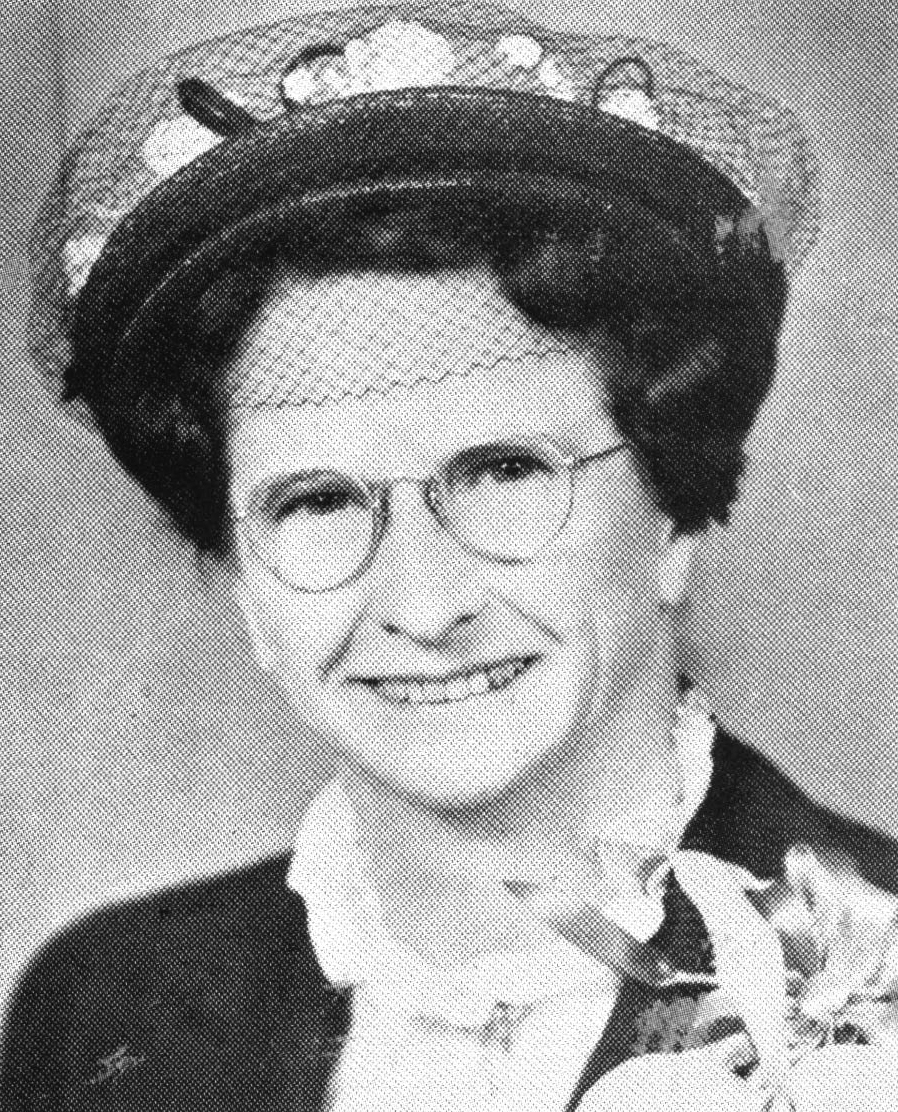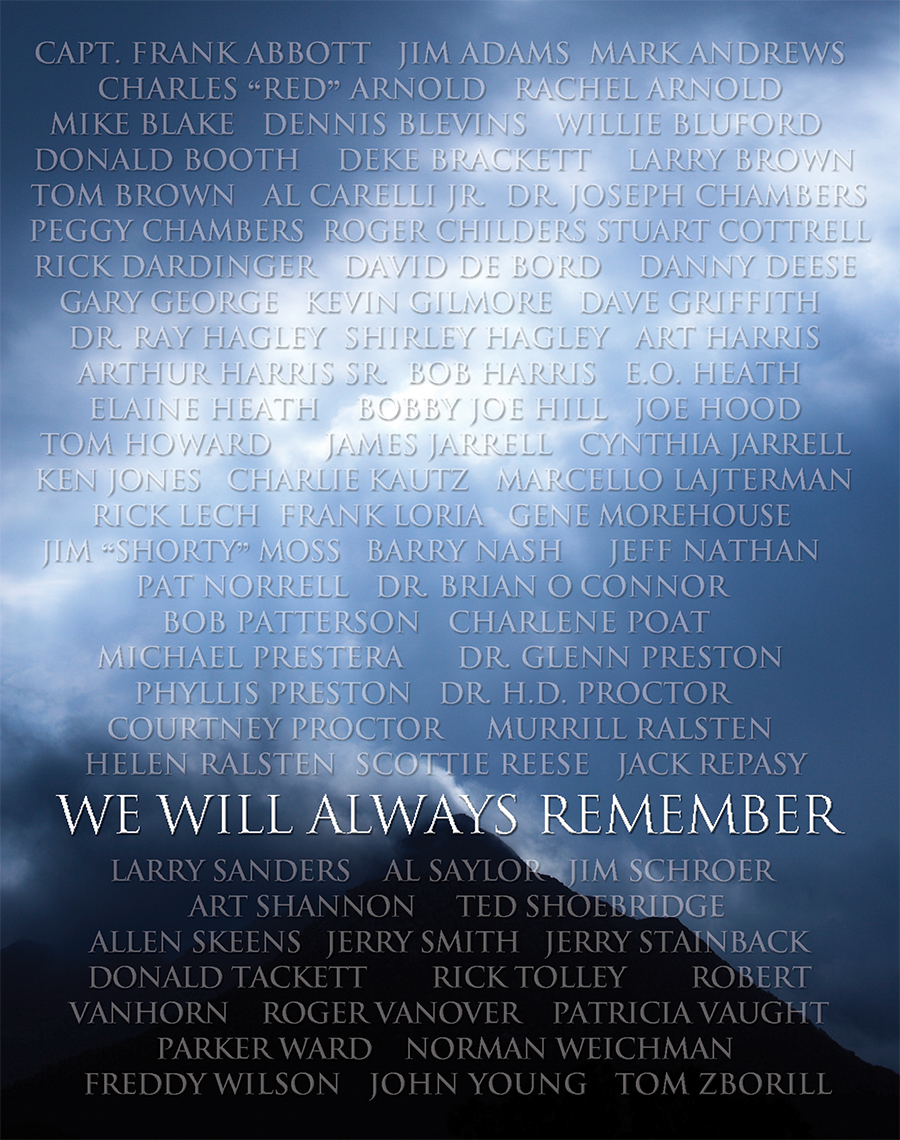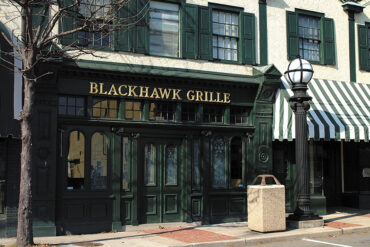The Stella Fuller Story
By Joseph Platania
HQ 16 | AUTUMN 1993
The street corner kettle booths and bell ringers for the Stella Fuller settlement have become so much a part of Christmas time in Huntington that it would be difficult to imagine the season without them. Those who live here know that the money they drop into the kettles and tambourines will aid the good work the settlement performs each year. Over the decades this homegrown charity has assisted countless thousands in need.
In March 1981, people from all walks of life crowded into the chapel at the Stella Fuller Settlement to bid farewell to the little woman known to many as the “Angel of Huntington” who died at the tender of age 97. The minister eulogized that she helped thousands of people because “they were the people she loved.” He added, “She wanted no higher reward or no greater esteem than to live among the people she cared for.”
Stella Fuller, with her midnight blue bonnet and trademark tambourine, had been a familiar face in Huntington for more than 70 years. Even in her 80s, she would regularly help collect donations for her mission on Huntington streets.
She was born Stella Lawrence Cremeans, on December 4, 1883, in Point Pleasant. Her childhood home was a comfortable farm on Guyan Creek near the village of Bryan, about six miles southeast of the Mason County town of Glenwood. At the age of 19 she left the security of her family and went to Huntington where she enrolled at a private school called the Marshall Business College.
Fallowing business school she moved to Welch, where she supervised a large group of stenographers for an important law firm. She also met Elmer Fuller, a Huntington bakery employee during this period. They were married in 1907 and settled in Huntington to begin a stormy relationship. A son, Bob, was born on October 24, 1908.
Stella’s conversion to her life’s work was dramatic. According to a biographical article by Nancy Whear: “One night in 1916, on a Huntington street corner, Stella held little Bob’s hand while she listened to the testimony of the young brother of a Salvation Army officer as he proclaimed the dedication of his life to the service of God.”
Stella was receptive to the young man’s story, having reached a crossroads of her own. Her time with Elmer had been an unhappy period. The possibility of a new life stirred something within her. Ironically, the Salvation Army Citadel, the organization’s headquarters, was just two blocks from her Fourth Avenue home. Lured by the Army’s religious and charitable programs, Fuller began attending services and volunteering her skills. Eventually she was hired as a part-time secretary at the Salvation Army.
As her family situation worsened, she devoted more and more time to the Army’s activities, including home visitations and taking up tambourine collections in downtown Huntington.
Stella Fuller’s humanitarian instincts blossomed during October and November 1918 when a nationwide influenza epidemic paralyzed Huntington. Doctors, nurses, church women and able-bodied volunteers worked around the clock to help the thousands stricken by the deadly disease. Although many worked valiantly during this desperate time, Stella Fuller outdid most. She became a heroine for ministering to the sick, finally falling victim herself. Elmer and Bob also caught the virus.
The Fuller family recovered, but Stella’s marriage had all but ended. In 1919 she and Elmer legally separated. Despite financial hardships, Stella continued her work with the Salvation Army and her blue bonnet and tambourine became common sights on the streets of Huntington. She didn’t hesitate to enter the places where men took their leisure, whether a fine club at a downtown hotel or even a smoky gambling den. In every place she appealed to their generosity on behalf of the Salvation Army.
As Stella became more devoted to her Salvation Army career, she and Bob moved into an apartment on the third floor of the Citadel building. She lived there for the next 20 years.
In 1933 Stella, now with the Salvation Army title of “Envoy Fuller,” headed the Army’s new branch in the Johnson’s Lane part of Huntington. The terrible poverty, mud, outhouses and shanties of the area near the city’s central business district had drawn the attention of citizens during the 1918 flu epidemic. A major goal of the “outpost” was to combat juvenile delinquency through recreational and religious activities for the young people. With assistance from the WPA program of Franklin Roosevelt’s New Deal, Envoy Fuller set out to build a recreational program, a major part of which was softball and basketball teams.
Dr. Sam Clagg of Marshall University remembered Fuller’s work in his old neighborhood.
“Down in West Huntington, where I grew up, came this dynamic woman, one Stella Fuller, and she was going to organize some kind of baseball league down there,” he recalled for the Whear biography of Fuller. “She came with no equipment, no place to play. She came with what she always had, and that was enthusiasm.”
Johnson’s Lane was “a tough neighborhood – a place that God forgot,” according to Clagg. “It took a lot of courage to move in there, but that was one thing Mrs. Fuller had a lot of.”
Unfortunately, problems developed between the courageous Fuller and her sponsoring agency as her West End work prospered over the next few years. As her 25th anniversary with the Salvation Army passed, the relationship had strained to the critical stage. In the eyes of the highly disciplined charitable organization, her independence as head of the thriving Johnson’s Lane outpost bordered on insubordination. The confrontation came to a head over the West End softball program, which had been breaking the Army’s strict Sabbath rule by playing Sunday games. In January 1943, Fuller was offered an unacceptable contract and resigned her position.
But Stella Fuller did not let her career languish. While serving under at least ten Salvation Army commanders she had built her own base of community support. Within days of leaving the Army, she opened a settlement of her own in a location near the Johnson’s Lane outpost. When word of her new plans became public, she had little trouble recruiting a group of prominent citizens to become the incorporators (later the board of directors) of her settlement. The board was unanimous in the selection of the new organization’s name – The Stella Fuller Settlement.
On January 10, 1943, the settlement opened its “door of hope and friendship” in a storeroom at 128 Washington Avenue, near 3rd Street West. At the time this was on the edge of one of the worst slum districts in Huntington. The downstairs of the rented building allowed only space for a chapel and kitchen, but with the help of Fuller’s supporters and son Bob, a beginning was made.
“We welcome anyone who wants to join us,” Fuller announced. “All races, sexes, ages, religious backgrounds are welcome. This is truly a community settlement.”
Bob Fuller had helped with the settlement since its first day, but later went into the real estate business. In 1962 he joined the settlement as a full-time assistant director and chaplain. He became executive director in 1979.
“It was unusual that mother started her settlement in her 60th year, an age when most people are ready to retire,” Bob once said in an interview. “She was an acute businesswoman. She cashed in her small life insurance policy for seed money to start her settlement and then began collecting on the streets with a city permit for soliciting for charity.”
Under Stella Fuller’s skillful leadership, the Washington Avenue settlement expanded into the area’s largest haven for the deprived and homeless. In addition to its two-story building with kitchen, chapel, offices and library, there also is an adjoining gym and fenced-in playground.
Following Bob Fuller’s death in 1991, Victoria Roberts, a veteran of nearly 30 years at the settlement, was appointed executive director. Today, she is assisted by Betty Whaley, liaison to the settlement’s board of directors.
During the past few years, the settlement has been in the process of streamlining its operations. However, it continues to offer a cornucopia of benefits and services to the Tri-State. Both Roberts and Whaley emphasize that the settlement receives all of their clients from the Cabell County Information and Referral Service, a United Way agency located in the downtown public library. This clearinghouse screens all needy clients and refers them to the appropriate agency of the 15 organizations available.
Under current guidelines, the settlement can pay up to $15 ($25 in 1994) of a needy family’s utility bills and $20 ($30 in 1994) toward the purchase of medications. The settlement can also pay up to $20 toward transportation costs (usually money for bus fare or gasoline for City Mission clients). These amounts are reimbursed by the United Way.
There also are distributions of donated clothing and shoes that benefit from 1,800 to 2,000 people annually. Additionally, the settlement issues backto-school clothing vouchers of $75 each for a family that is not eligible for welfare assistance. Clothing, which also is available to transients and the homeless, is distributed on a monthly basis with special distributions just before school begins and at Christmas.
A wide variety of staple food items and household/personal care items donated by the Food Bank and other suppliers stock the settlement’s pantry.
Religious services are held at the chapel on Tuesday, Thursday, Saturday and Sunday. Area ministers volunteer their time to conduct services.

At Christmas there is a “Toy Gift Shop” in the gym where donated toys are distributed to clients. The settlement also purchases at least two toys for each child served. In 1992, 600 children were provided with toys at Christmas.
Former activities of the settlement have included housing and feeding transients, a community band, distribution of furniture and bedding, prison rehabilitation, an employment bureau, a playground, and various clubs such as the Camp Fire Girls, Boy Scouts and a senior citizens club. They have all been discontinued as other agencies have stepped in to provide similar services.
A half-century ago, hundreds, perhaps thousands, of children filled the streets of Huntington from 1st Street West to the Johnstown Road area. Many of the children lived in poverty. Their clothing was worn and old, their food supply was inadequate and their future was bleak. It was the desire to help these children and their families that inspired Stella Fuller to open her settlement at 128 Washington Avenue.
The settlement dates its official beginning from April 5, 1943, when it was incorporated by 22 prominent Huntington residents representing a wide range of business, labor, professional and private sector participants.
Three years after the settlement opened, a writer for the Herald-Advertiser reported that “it ranked high among Huntington forces fighting to take youth off the streets and give them healthful supervised recreation.”
Later, Edward H. Long, an executive of the Huntington Publishing Co., wrote “the very fact that I have served as president for the past 12 years is proof of my confidence and realization of the need for its existence. I have been especially impressed with the economical way funds are handled to accomplish so very much with so very little.”
In 1992, the settlement’s “benevolent program” provided assistance in the areas of food, utilities, clothing, medications, transportation, recreation activities and religious services to nearly 16,000 persons. Its annual budget was $83,390 with $20,000 received from the United Way and the balance from donations such as the Christmas and Easter appeals and kettle booth collections. Whaley describes the settlement as a “lean machine” operating on a “lean budget.”
Both Roberts and Whaley point out that contributions from businesses, service clubs and the private sector have decreased considerably, partly due to the economy and competition from fundraising drives by other agencies that help the disadvantaged.
From December 1 through December 24, there will be registration for Christmas food baskets for more than 400 families from Cabell, Wayne and Lincoln counties in W.Va. and Lawrence Co. in Ohio. The settlement’s traditional Thanksgiving and Christmas dinners are open to all. Director Roberts said that the 1992 Thanksgiving dinner drew 400 guests to a bountiful feast.
The Thanksgiving feast has an intriguing story behind it, since the dinner was financed for 29 years by an anonymous Huntington businessman who died in 1974. Several years ago it was suggested that the benefactor was, in fact, a bookie and the operator of a Huntington gambling house. He wanted to anonymously sponsor the Thanksgiving dinner as his way of helping. The story was partially substantiated in a Huntington newspaper article after the benefactor’s death.
Apparently, Fuller used to go into the gentleman’s place of business with her tambourine to collect for her charity. When he learned one year that Fuller didn’t have enough money to organize the annual Thanksgiving dinner, he offered to flip the bill for the event. That was in 1944, and for the next 29 years, he continued to pay for the dinner, according to his brother.
The Huntington Jaycees Young Businessmen’s Club stepped into the breech in 1974 and took over the sponsorship of the Thanksgiving feast.
The settlement has also weathered adversity, the greatest of which was a fire in August 1980 that gutted the kitchen and chapel, almost trapping the 96-year-old founder and two other people who were asleep upstairs. But with the help of a federal grant, insurance, and volunteer work, the kitchen and chapel were rebuilt as well as the refurbishing of two offices and an apartment upstairs.
Several months after the fire, on October 14, 1980, “Stella Fuller Day” was declared in Huntington by proclamation of the mayor. This was done to express the city’s grateful appreciation for Stella Fuller’s more than 60 years of service helping the poor and disadvantaged of the community.
If you would like to contribute to The Stella Fuller Settlement, write to: The Stella Fuller Settlement, 128 Washington Avenue, Huntington, WV 25704.





